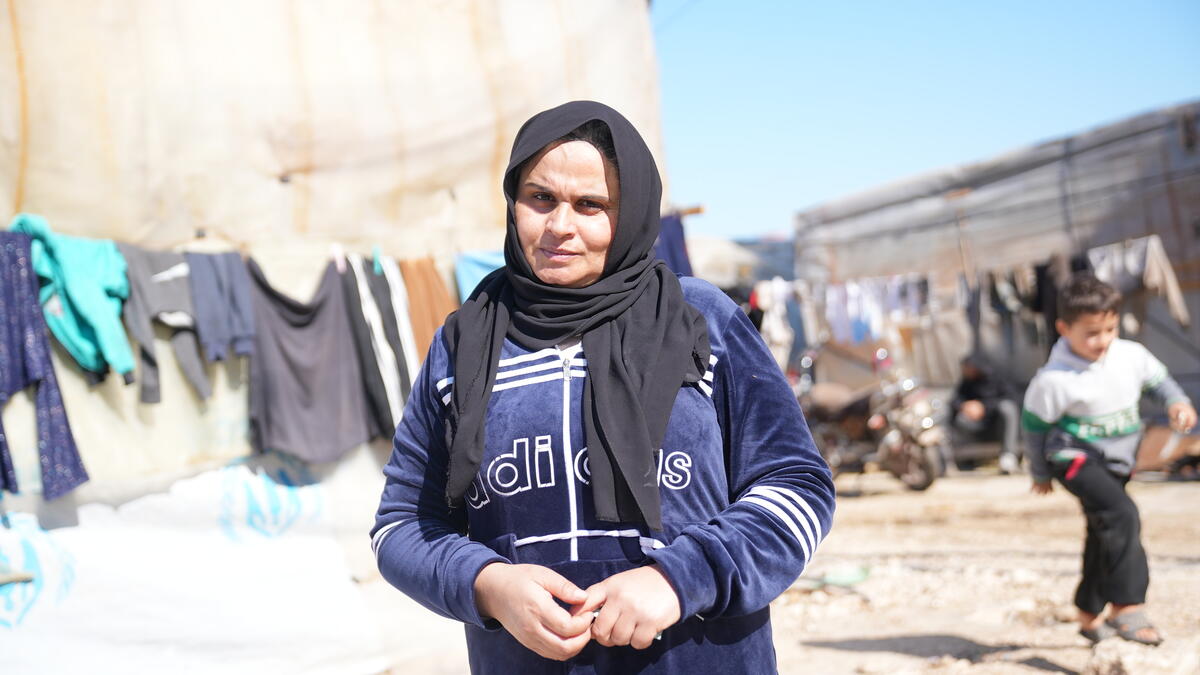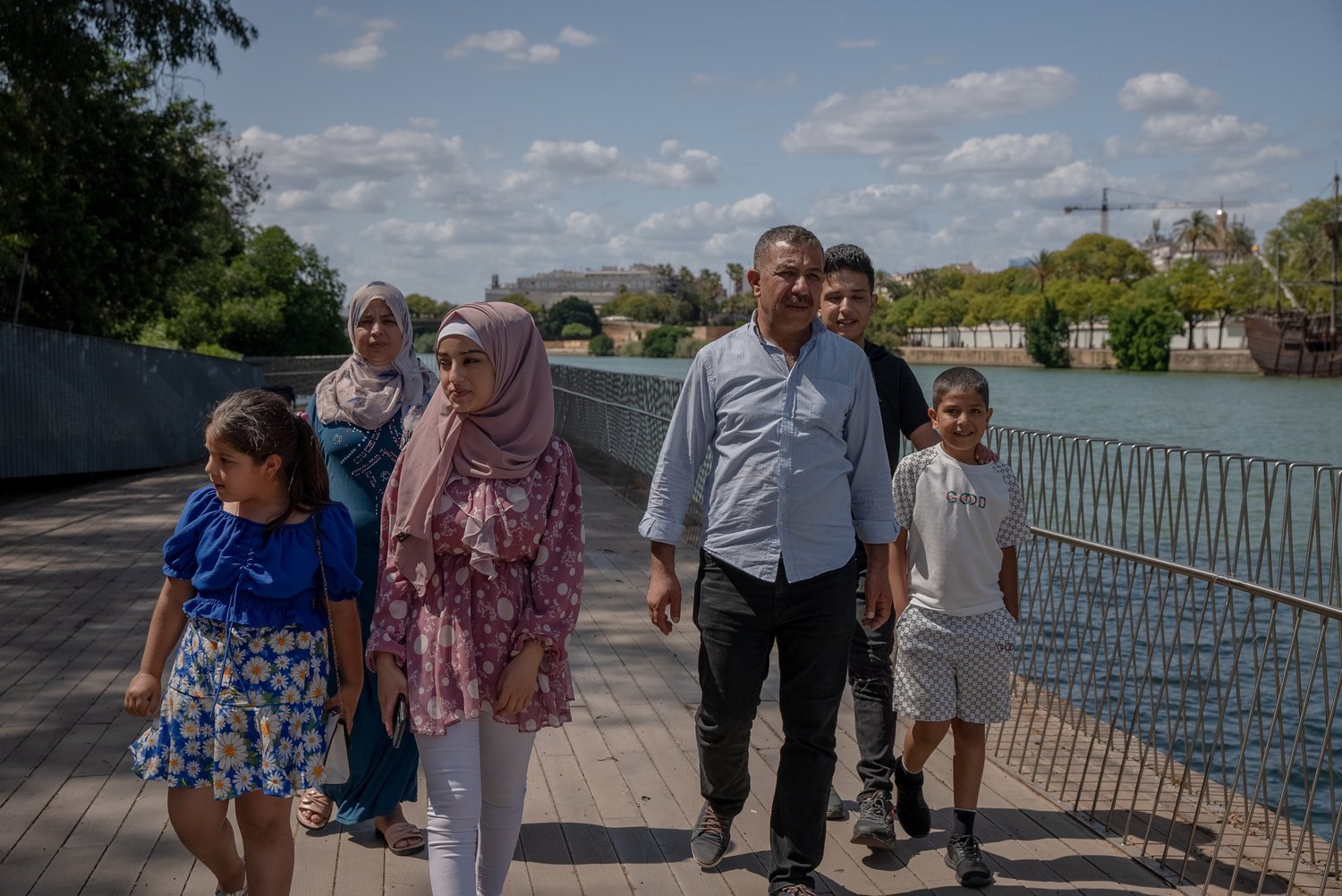Thousands of Syrians flee into Iraq's Kurdistan region, major influx continuing
Thousands of Syrians flee into Iraq's Kurdistan region, major influx continuing
Since Thursday of last week around 30,000 Syrians have streamed into northern Iraq after fleeing communities across a wide swathe of northern Syria.
Yesterday's (August 19th) crossings numbered more than 4,800 people, at Sahela some 120 kilometres northwest of Mosul. Some of those coming across were from Malikiyye city in the neighbouring Syrian governorate of al-Hasakah. They told us they had fled reported bombs earlier that morning. Others arriving over the past few days have been from further west, including Efrin and Aleppo, as well as Al Hassake and Al Qamishly.
With several tens of thousands of people having crossed since last week, this new exodus from Syria is among the largest we have so far seen during the conflict, which is now into its third year. As well as people who told us they were fleeing recent bombings, others say they were escaping fighting and tension amongst various factions on the ground. Also cited was the collapse of the economy due to war and the resulting difficulties in caring for their families.
The influx began last Thursday when the Kurdistan Regional Government authorities in northern Iraq suddenly opened access to the temporary Peshkhabour pontoon bridge north of Sahela, allowing several hundred people camped in the area since earlier last week to enter Iraq. By the end of that day and into the following morning thousands of people had swarmed across the swaying bridge over the Tigris. As of Saturday, UNHCR now estimates that 20,000 Syrians had crossed the Peshkhabour bridge. This was followed by crossings of around 6,000 persons on Sunday when fleeing Syrians were directed to use the Sahela border crossing, to the south of Peshkhabour.
In response to the influx UNHCR and partner agency teams have erected shelters to provide shade. Water and food distributions have also been set up at the crossing points. The International Organization for Migration and the Kurdistan Regional Government have provided buses and trucks to move the thousands of people onwards from the border zone deeper into Iraq.
In Erbil Governorate, further to the east, UNHCR has established a transit site at Kawergost, to the north of Erbil town and in Khabat District. One thousand one hundred UNHCR tents have been erected there along with 200 tents assembled by the International Rescue Committee. The Kawergost transit site is now sheltering some 7,000 to 9,000 Syrians. The President of the Kurdistan Region, Massoud Barzani, visited the transit site yesterday.
Over the past days UNHCR has dispatched more than 90 trucks carrying aid from Erbil. Relief items have also been distributed, including tents, plastic tarpaulins, sleeping mats, blankets, kitchen sets, hygienic supplies, water tanks, portable latrines, portable showers and electric fans. However, because of the scale and speed of the influx, some people at Kawergost are still without tents and having to camp under tarpaulins or other makeshift shelters.
Yesterday, the authorities provided access for UNHCR to a warehouse in Bahrak and 2500 Syrians are now being housed at this facility. In addition, additional land has been identified in Erbil's Qusthtapa district where a further transit site will be established. As well as those in tented accommodation, some 14,000 people are living with host families or are encamped at mosques in the Erbil region.
Further to the southeast, at Sulaimaniyah, 4,000 people are currently accommodated temporarily in 11 schools. As in Erbil, a temporary site is being set up. Some 3,000 people who arrived yesterday (Monday) were transferred to Sulemaniyah.
As of this morning, a further 2000-3000 people were reported waiting close to the Syrian side of the border, and expected to cross today. On the Syrian side, the border at Sahela is under the control of Syrian Kurdish forces. The Kurdistan Regional Government has identified an additional site in Kushtapa where it has indicated that UNHCR may establish a further transit camp.
To boost stockpiles of rapidly depleting aid supplies within Iraq, UNHCR has sent 15 tractor trailer trucks to northern Iraq from its main regional stockpile in Amman. That shipment, expected to arrive before the end of the week, includes more than 3,100 tents, two pre-fabricated warehouses and jerry cans. Additional supplies are currently being organized.
Longer term, in cooperation with the Kurdish Regional Government, UNHCR and its partners are building the Darashakran camp, which is expected to be ready to accommodate refugees within a matter of weeks.
UNHCR built Domiz refugee camp near Dohuk, Iraq earlier this year. Domiz, originally constructed to accommodate 15,000 Syrian refugees, is currently overcrowded with more than 55,000 residents - meaning that new arrivals are having to be accommodated elsewhere. Prior to this latest influx, UNHCR had registered 155,000 Syrian refugees in Iraq.
For more information, please contact:
- In Amman, Peter Kessler at +962 79 631 79 01 or [email protected]
- In Geneva, Adrian Edwards at +41 79 557 91 20 or [email protected]
- In Geneva, Dan McNorton at +41 79 217 30 11 or [email protected]








